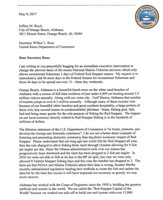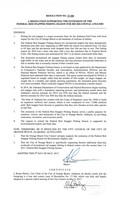Orange Beach city leaders met earlier this week in a special called meeting to send a message to the federal government this year’s shortest ever three-day federal red snapper season was untenable …
This item is available in full to subscribers.
Please log in to continue |


Orange Beach city leaders met earlier this week in a special-called meeting to send a message to the federal government this year’s shortest ever three-day federal red snapper season was untenable to Gulf Coast residents.
Councilman Jeff Boyd told the packed council chambers the city had elected to pass a resolution to send a letter to the Secretary of Commerce and the administration expressing concerns about the incredibly shortened season created by the National Oceanic and Atmospheric Administration (NOAA) to try to get some sort of immediate relief.
“The Department of Commerce is over NOAA, and NOAA is over fisheries, so because of the urgency of the matter, this is what we’ve chosen to do,” Boyd said.
Boyd read the letter during the meeting, where he asked the Commerce Secretary to extend the recreational federal season for another 46 days spread out over 13 three-day weekends. Boyd also mentioned the troubling economic impact the shortened season could have on the area.
The 13 weekend extension Boyd asked for in the letter would more closely match the allotted days given to charter fishermen this season, a 49-day federal season.
Boyd added he had recently visited Washington DC to lobby for a longer snapper season, speaking with the acting head of NOAA Paul Dorms.
“I told him when we were walking the halls in Washington that you’re better off giving us zero days so you can really make everybody mad,” Boyd said. “What they’ve done is just torment us with three days.”
Boyd said copies of the letter would also be sent to the White House and members of Congress for the Gulf Coast states, including Alabama’s Senator Richard Shelby, who sits on the Senate Appropriations Committee.
“I’ve chosen to go straight to Senator Shelby because he holds the purse strings for what NOAA gets,” Boyd said. “We take away the money or we change the money, we change the direction it goes.”
According to local officials, the heart of the problem begins with the Magnuson-Stevens Act, a federal law enacted in 1976 that allows the National Marine Fisheries Service (NMFS) to determine when a fish stock is overfished and apply regional and individual catch limits in order to protect the stock.
The act also created regional fishery management councils in an effort to help steward fishery resources in various regions of the country that would help create annual catch limits, individual catch limits and help monitor the status of their regions’ waters. Alabama is a part of the Gulf of Mexico Council that includes Texas, Louisiana, Mississippi and Florida.
Local fishermen and elected leaders alike said NOAA and NMFS have been relying on bad data on the number of red snapper that vastly undercount the true population for this area, which has led to increasingly shorter seasons every year.
Alabama’s state waters extend to nine nautical miles into the Gulf, with a state season lasting 67 days from May 26 to July 31, but that extension isn’t necessarily as helpful to recreational fishermen as it may seem.
“Everybody that is a recreational fisherman knows that nine miles is sort of a joke,” Boyd said. “If you’ve got a reef within nine miles, you know you can’t protect it. When you’re on it, you can’t anchor on it. You’ve got to drift because there’s four or five other boats out there on you.”
Boyd also said the federal government hasn’t lived up to everything it’s even required to do by the Magnuson-Stevens Act when it declares a species is overfished.
“If you read the Magnuson-Stevens Act, it explains that if the data they have says that the stock of a certain species is not where it needs to be then they have to protect that species,” Boyd said. “If you read down further, it says if they’re aware of that, then they have to contribute money to regain that stock and do something to try to help it. They’ve not taken the second step at all and they’ve admitted that their numbers are wrong. Our frustration is you missed it back here at number one. You haven’t even achieved two or three. Something has got to change, and we don’t have time to wait on it.”
Local residents agreed with Boyd.
“I’ve seen it go from a ten fish limit to a seven fish limit, then it goes to a four fish limit and they were never going to lower it anymore,” former Orange Beach resident and fisherman Bill Hynes said. “Then it goes down to two.”
Hynes warned that not allowing more fishing of red snapper could be detrimental to other species in the Gulf.
“What they don’t realize is that when snapper gets to 15, 20 pounds, they’re so voracious they eat everything, so we’re going to have a shortage of big liners, white snapper, scamp, triggerfish and others because they’re going to eat it all if they get overpopulated,” Hynes said.
Mayor Tony Kennon said the city of Orange Beach has worked hard to partner with the state and the Corps of Engineers to build an artificial reef system in the area that is among the largest in the world, over $450,000 in funds over the years.
“We have the largest reef system in the world,” Kennon said. “The frustrating part is we created a harvest of fish that we’ve sown the seeds and planted. Now, it’s like telling a farmer he can’t harvest his corn for whatever absurd reason the federal government might come up with.”
Kennon said the economic impact ranges of recreational fishing ranges into billions of dollars.
“The recreational industry supports multi-billion dollar economic impact,” Kennon said. “As far as I’m concerned, this is detrimental to our economic interests and the well-being of our citizens.”
Other residents agreed.
“I think the people in Washington who set these seasons don’t realize the recreational fishermen support a complete industry that surrounds the boat builders, the boat maintainers, the tackle providers, the accommodation industry, so there’s a huge economic impact that’s made by private fishermen,” William Thomason said. “If the science has brought us to three days for recreational anglers, it’s kind of obvious to me that there’s only two ways we need to go here. Either every snapper needs to have a tag put on it or we need to close it down. If snapper is in such bad shape we have to go to three days, just close it for everybody. If the snapper needs that much support, and we know they don’t.”
Kennon said the science backing the continually shorter federal seasons needs to be reviewed again and measured accurately.
“Bad science begets bad science,” Kennon said. “Once you start down that road of bad science, it exponentially creates consequences and that’s where we’re at. This all started with significantly bad science.”
Kennon said he felt like the federal government was just digging in and refusing to admit their error.
“It is almost an unwilling movement to correct a mistake made way back when, going back to the Magnusson-Stevens Act,” Kennon said. “We have to just continue to fight at every turn, every opportunity. At some point, enough is enough. I’m at that point just totally with the federal government now. When are we going to get them out of our lives at every aspect, not just fishing.”
Kennon and Boyd both mentioned a potential boat protest talked about on social media, but Boyd said while he understood why people would want to make a show of force like that, he ultimately couldn’t participate himself after talking with state officials.
“We talked about taking an executive path versus an emotional path,” Boyd said. “As much as I want to be the first guy out there, it just wasn’t the right thing for me to do.”
Councilman Jeff Silvers looked at the season shortening as a simple reduction of rights for citizens.
“It’s our right that they’re taking away,” Silvers said. “It’s your right that they’re taking away. Enough is enough. A lot of folks have asked what are you going to gain by this resolution. I’m going to gain satisfaction when I walk out that door that we are still trying to regain our rights to be a recreational fisherman and we need to be solid in that. We are still recreational fishermen in this community along this coast. It’s not just about economics. It’s about rights that are being taken away by bureaucrats in Washington that don’t even know or have been in the Gulf of Mexico to witness it themselves.”
Boyd countered a citizen’s comments to trust the process, saying he wasn’t sure the city could wait that long.
“Another two years is going to have such an economic impact on us,” Boyd said. “The reason we’re asking for an immediate intervention is to say give us the benefit of the doubt, not the bad data.”
Kennon added he didn’t have much faith in trying to work within the current system.
“The federal government can’t do anything correctly,” Kennon said. “The Gulf Council - first off, they’re chasing a false premise that there’s not enough fish, so now they’re trying to fix a problem that doesn’t exist. I don’t believe for a minute the recreational fishermen is represented to any great degree. There’s flaws from the very top to bottom. Somebody’s got to get a hammer and I don’t know where that comes from. Sometimes you have to throw the system out and start over.”
Blakey Ellis, the executive director for the Coastal Conservation Association, said trying to make legislative changes is also a tactic that could be taken.
Ellis told the council that an act currently making its way through Congress, the Modernizing Recreational Fisheries Management Act of 2017, could help some with the issue.
“It does provide flexibility to the Magnuson-Stevens Act, everything from the allocation side, alternative management flexibility, making fishery timelines not as strict, annual catch limit flexibility and data collection changes,” Ellis said.
Kennon said he still feels like no one is looking out for recreational fishermen.
“If you only have three days on the recreational side or a fish is going to be decimated, how do you give 40 or more to the commercial side?” Kennon asked. “It just makes no sense. No one is looking out for recreational fishermen or we wouldn’t have just three days.”
The council unanimously passed the resolution to send the letter out, but Kennon said it was frustrating the city was having to take measures like this.
“We shouldn’t have to advocate for ourselves when we have appointed and elected officials that are supposed to be representing us,” Kennon said.